Posted by Alan Homer on 2023 Nov 23rd
Hunting in Grizzly Country - Inside MDT
I've been hunting in grizzly country for most of my life, and to say I've had a few interactions with them is an understatement. But that is to be expected when you are in their territory. I will say this more than once in this blog, but you must always be aware and ready for the unexpected, not let your guard down, and not be complacent. I am always guilty of this until I have a close call; then, I am more aware. It's a cycle that continuously repeats.
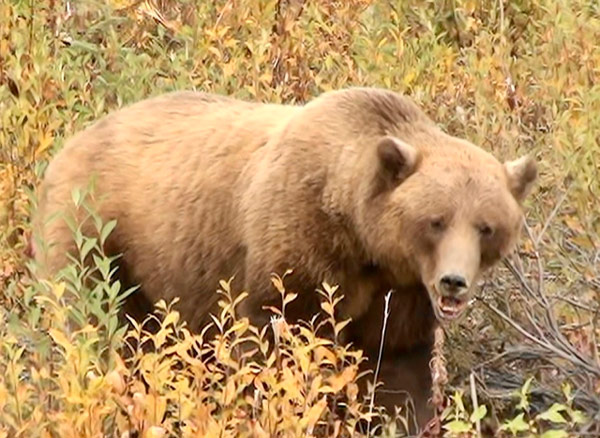
This is a sow that had two cubs with her.
As mentioned, I have had many interactions with grizzly bears. For example, we had one grizzly stroll into our moose camp three years in a row! He was big and smart. He stole some meat, damaged the truck, and then became aggressive. I stayed up one night in a chair outside the tent and waited for him in the dark; it was a full moon and a clear night, so visibility was good. After a few hours, he came in very cautiously. As I slowly raised my rifle, the guy beside me suddenly moved. The bear spotted the movement and ran into the timber. Then he circled us and was 10 yards in the timber, crashing and breaking trees. I yelled at him, and the sound was enough to waive the beast. Ultimately, we had to pack up and leave as he returned for the meat. That was the last time we saw him.
On a recent mountain goat hunt, I shot a bear in self-defence. We had a goat on our backs, and a grizzly stalked us for 4 km before making his move on us. He got a warning shot, but that just aggravated him. He hunched up like a cat, ready to pounce with his hackles up; he showed me his teeth and turned his head sideways while keeping his eyes on me. So, I did what I had to do. I reported the incident to the Conservation Officer. After a discussion of the events, he concurred with my reaction. Survival is paramount to hunting in the wilderness.
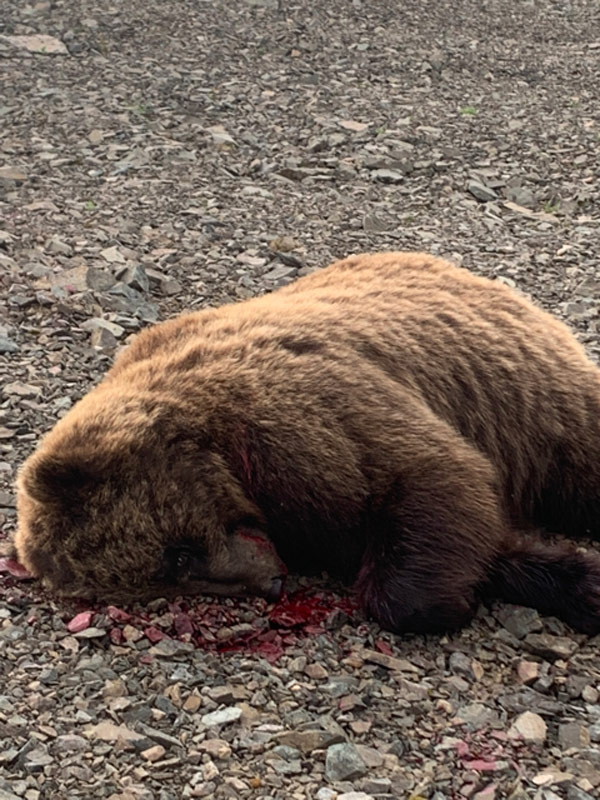
This is the grizzly that stalked us for 4K before making his move on us. After a warning shot that only angered him, I did what I had to do.
PREPARING FOR GRIZZLY COUNTRY
Those are just a couple of stories; I have many more. Bear encounters are relatively rare but happen more often as their population increases. What can you do to prepare yourself when hunting or camping in grizzly bear country? A quick and easy answer is to carry bear spray. For me, spray is a last resort. If I can't access my rifle, I pull out the spray. Bear spray is great for hikers or areas that have restrictions on firearms. For easy accessibility, I keep mine attached to my bino harness with the nozzle pointed out and away. That way, I don't have to remove it to discharge it if needed. Also, have your rifle where you can shoulder it quickly, especially if you keep it strapped to your pack while hiking. In the lower 48, having a sidearm chambered in a caliber capable of taking down a bear is an excellent idea—something that isn't as easy as it once was in Canada. When I go stone sheep or goat hunting, our rifles are secured tightly to our packs. Still, I have practiced getting it shouldered quickly, as mentioned previously. When we are in thick timber, we make a lot of noise to let any bears or other predators know we are in the area. The key takeaway is to have a plan in place. Practice that plan so if danger arises, it won't be your first time; it could save your life or the lives of your hunting buddies.
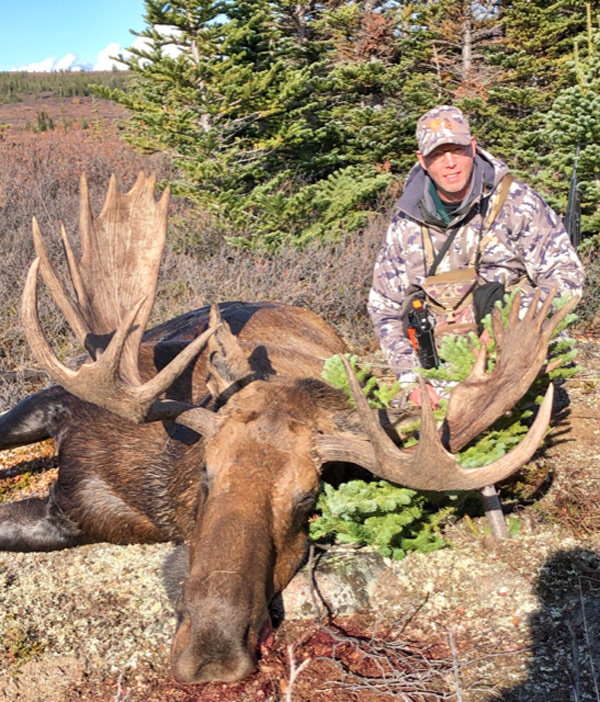
This is the only picture I have of my bino harness with the bear spray attached. You can see the nozzle is pointed in the forward direction.
SITUATIONAL AWARENESS AND FOOD STORAGE
Next, always be aware, keep your head on a swivel, and don't get tunnel vision. Look for signs, tracks, scat, etc. There have been instances where I smelled the bear before I saw it. Grizzlies are huge and are surprisingly fast. You can identify a grizzly track from a black bear from the claw marks. A grizzly has long claws, and they will leave an impression 2-3 inches in front of the toes.
In sheep camp, we store all our food in dry bags and keep the food fully sealed. This reduces the food's scent. All our garbage is stored in Ziplock bags, and we always make sure the freeze-dried food bags are resealed. We store these items away from the tents under rocks, and only a mouse has ever gotten into them. If the stars align and we successfully harvest an animal, we stuff the meat into garbage bags and store it in a Kuiu game bag (or a similar bag), then bury it in a snow patch. If no snow patch is around, we hang it up high and away from our tents to allow the meat to cool, or in other circumstances, we submerge the meat in a creek in a dry bag. As for the horns, we always wrap a garbage bag around the skull and tape it on with electrical tape, and if you can't hang them up high, I will always keep them close to me; I don't want to lose them. I also keep the sheep cape with the meat. With this level of preparation, we have been fine while sheep hunting.
In a moose, elk, or deer camp, it's the same as in a remote backpacking camp. Keep your food and garbage locked and sealed up. If you keep your camp clean, it will reduce the probability of a visitor coming into camp. If you harvest an animal and when you are completed skinning and quartering the animal. Hang that meat as high as you can, and after it is cooled and dry, cover it with game bags and take all the scraps and hides far from camp. That will greatly reduce your odds of a bear or other predator.
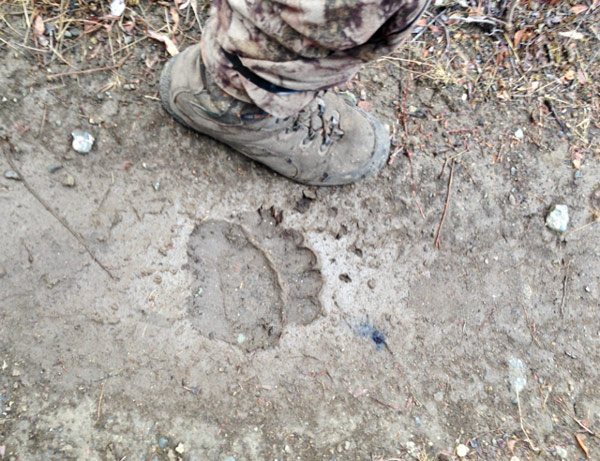
Grizzly bear track.
While out on your hunt, you must be ready. When you are set up and quiet, calling in the animal you are after and even using animal scents, you create a target. Not only are you trying to lure in an animal, but you also create a facade of that same animal. Suddenly, you have become the prey and have informed predators of your position. Make sure your rifle is ready to go. Things happen quickly and unexpectedly. Be ready.
After the kill, you should keep a rifle ready and your head on a swivel. Look all around and listen—make noise. In some areas, grizzlies are accustomed to the sound of a rifle shot and consider it a dinner bell. They will come to the sound of the shot, as they know a gut pile will be waiting for them. If you must leave the meat overnight, carefully approach the carcass the next morning. Make lots of noise and try to view the kill sight from a distance before approaching. Check to see if the carcass had been disturbed from how you left it the night before. I usually put a few tree limbs on it and see if they have been moved or knocked down. If you don't see a bear and you approach the kill, and the gut pile or carcass is buried (and it doesn't take a bear long to bury it), then you better be on extra alert; this is a dangerous situation. In past years, we have retaken moose from grizzlies.
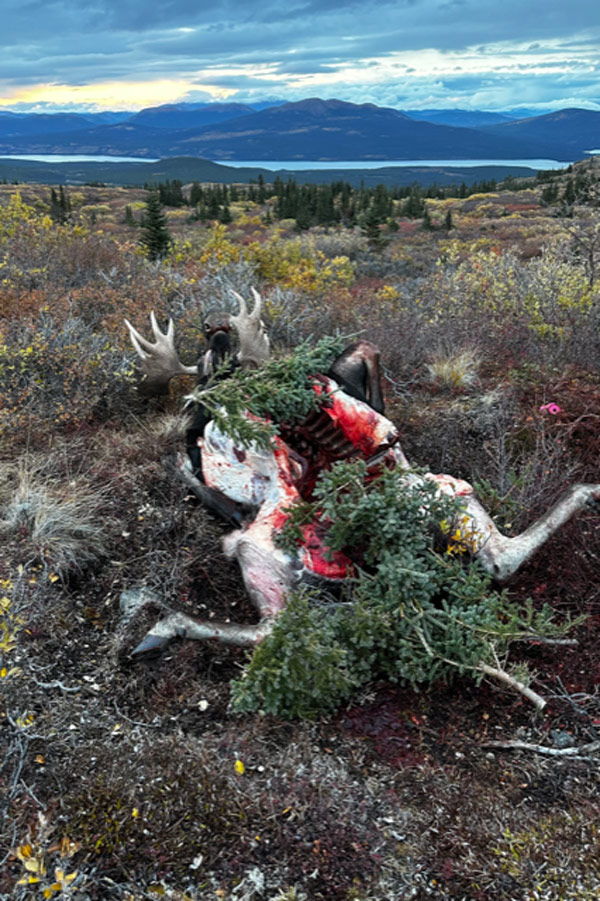
This is how we left this bull overnight. If an animal got at it, the branches would be knocked off. Very easy to see from a distance.
Hopefully, I touched on most scenarios that could happen in the field, but I am sure I have forgotten a few. For the most part, a grizzly will not attack you just to eat you. If you surprise them, or if they have a kill to protect, or if it's a sow with cubs, you have a good chance of being mauled. My best advice, which is a last resort, is to play dead. If the bear thinks you are dead, it might just leave you alone after it roughed you up (maybe not as bad as in the Revenant). But if you can't access your rifle, bear spray, or knife, it might be your only hope. The best advice is to stay alert, be prepared, and keep a clean camp.
ARTICLES FROM ALAN HOMER
- How to Hunt Moose in British Columbia
- Necessities for a Backcountry Hunt
- Staying Mentally Strong in the Backcountry
- Fitness for Backcountry Hunting
- How To Hunt Stone Sheep In British Columbia
ABOUT THE AUTHOR
Alan Homer lives in British Columbia. He is an accomplished competitive shooter and hunter and owns the BCExtremeOutdoorsman YouTube Channel. He can be reached via Instagram @bcextremeoutdoorsman.

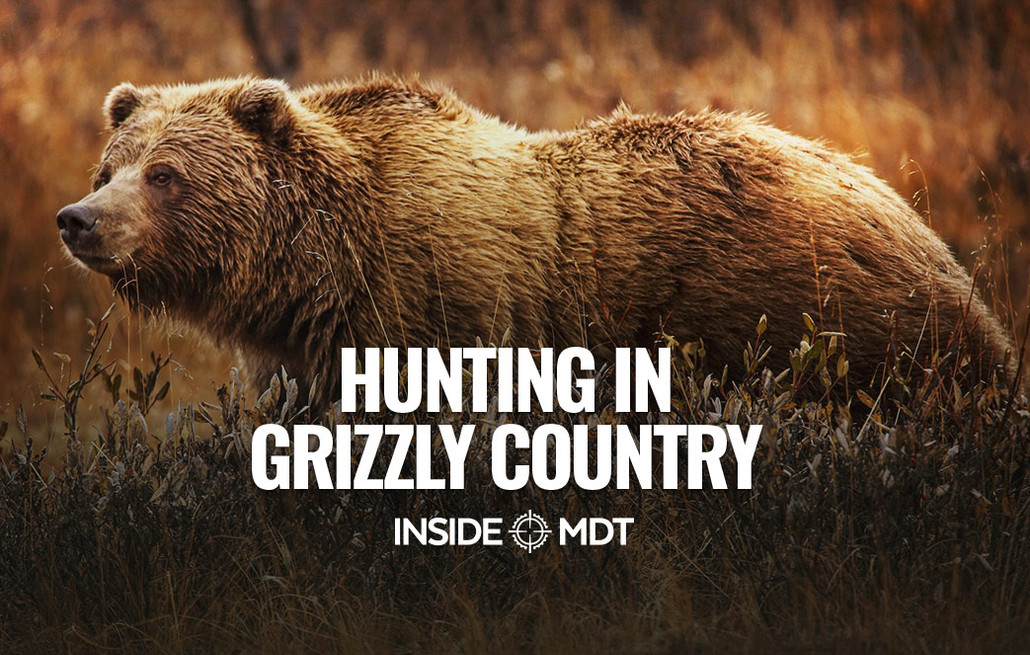
 EUR
EUR
 Canadian Dollars
Canadian Dollars
